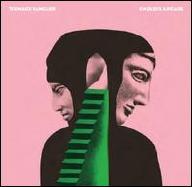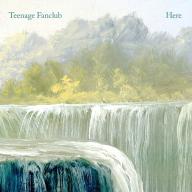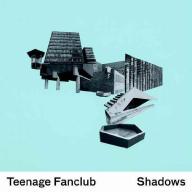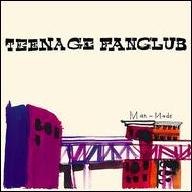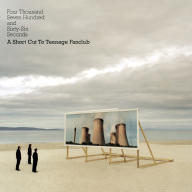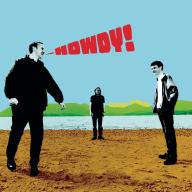Hailing from the Bellshill area of Glasgow, Teenage Fanclub first came together in 1989 after the breakup of singer/guitarists Blake and McGinley's previous band, the Boy Hairdressers. A musically similar outfit born out of the C-86 movement, the Boy Hairdressers issued the cult single "Golden Shower" on the Scottish indie label 53rd and 3rd before calling it quits. Blake then briefly joined the BMX Bandits before teaming with McGinley and singer/bassist Gerard Love to form Teenage Fanclub. Joining them was drummer Francis Macdonald, a fellow Boy Hairdresser and BMX Bandit, who played on half of the group's indie debut, A Catholic Education, before leaving to make way for drummer Brendan O'Hare. Released in 1990 on Creation Records in the U.K., and on the then-fledgling Matador label in the U.S., A Catholic Education primarily featured songs by Blake and McGinley, including several that had initially been intended for the Boy Hairdressers. Rife with murky guitar fuzz and a brash, D.I.Y. punk attitude, what stood out most on the album were memorably hooky anthems like fan favorite "Everything Flows," which fit in nicely alongside bands like Jesus and Mary Chain and set the groundwork for the band's future sound.
Following the Don Fleming-produced God Knows It's True EP, Teenage Fanclub signed with Creation and began working on what would eventually become their official sophomore album, 1991's Bandwagonesque. However, around the same time, purportedly after a bit of drinking, the band took up Fleming's offer to record a quick, one-off album in a single night. The resulting The King was a famously ramshackle collection of songs, including improvised instrumentals and a cheeky rendition of Madonna's "Like a Virgin." Initially intended as a small, limited-edition pressing, The King wasn't well-received upon release; it was often misconstrued as a shady attempt to close out their deal with Matador, when in reality the project was a joyful creative excursion, and remains one of the band's more intriguing, if non-essential releases.
All of this however, would be quickly overshadowed by the group's official second album. Released in 1991 on Geffen Records in the U.S., Bandwagonesque was a brilliant evocation of the radiant '70s power pop of bands like Big Star and the Raspberries, infused with TFC's distinctive penchant for memorable pop choruses and distortion-laden guitar hooks. It also marked the first time the band embraced a fully democratized approach to songwriting duties, with each of the three frontline members contributing songs -- an approach that would become one of the group's hallmarks. As their breakthrough record, Bandwagonesque spent 13 weeks on Billboard's Heatseekers chart, eventually peaking at number one. It also spawned several Top 20 hits on Billboard's Modern Rock Tracks chart, including "Star Sign," "What You Do to Me," and "The Concept," the latter of which they performed on Saturday Night Live. In the wake of the album's success, they joined Nirvana on tour, after which Kurt Cobain was famously quoted as saying they were the "best band in the world." By year's end, Bandwagonesque had landed at the top of Spin Magazine's Best-Of list, surpassing Nirvana's Nevermind, My Bloody Valentine's Loveless, and R.E.M.'s Out of Time.
A mere matter of weeks after coming off the road, the band returned to the studio in 1992 to begin work on their follow-up, 1993's Thirteen -- named for the number of tracks on the release, rather than for Big Star's song of the same name, as was commonly believed at the time. The lack of planning for the record's production made it a protracted and often labored process, exacerbated by a hard-fought disagreement with Geffen over the albums' cover art. Thirteen also revealed a darker, more bitter lyrical style, and found the band embracing a heavier guitar sound, drawing comparisons to Neil Young and Crazy Horse. While it failed to have the same impact in the U.S. as its predecessor, Thirteen nonetheless reached number 14 in Britain on the strength of such well-regarded songs as "Hang On," "Radio," and "Norman 3." Citing creative differences, O'Hare left the band after touring for the album, and briefly joined Mogwai before forming his own band, Telstar Ponies.
When TFC returned to the studio for 1995's Grand Prix, O'Hare was replaced by ex-Soup Dragon and former Boy Hairdresser Paul Quinn. Produced by David Bianco, Grand Prix benefitted from a longer songwriting process, and found the group embracing a less sludgy, more crisply attenuated pop/rock sound. The album is often cited as one of their best, and several tracks on Grand Prix would become some of the band's best-loved songs including "About You," "Sparky's Dream," "Verisimilitude," and "Neil Jung." The album drew significant critical praise and peaked at number seven on the British albums charts, but Geffen nonetheless dropped the group from its roster the following year.
Moving to Sony, Teenage Fanclub once again conscripted producer David Bianco and began work recording at London's Air Studio. Titled after a cheeky reference to their Scottish roots, 1997's Songs from Northern Britain built upon the sparkling folk-rock classicism of Grand Prix, expanding the group's sound with a bevy of acoustic instruments, strings, and brass. Songs like "I Don't' Want Control of You," "Take the Long Way Round," "Your Love Is the Place I Come From," and the British Top 20 single "Ain’t That Enough" felt more personal, reflecting upon themes of nature, romantic fidelity, and the passing of time. Still riding a wave of goodwill engendered by Grand Prix, Songs from Northern Britain also proved to be one the band's highest-charting albums, reaching number three in Britain.
In 2000, the Teenage Fanclub rounded out their U.K. tenure at Creation with Howdy! Self-produced at David Gilmour's Astoria studio and Rockfield Studios in Wales, Howdy! saw the band embracing an even more ambitious mix of orchestral arrangements and varied instrumentation. The record included a handful of songs that would become very well-regarded, like "Dumb Dumb Dumb," "My Uptight Life," and "I Need Direction." It was also the first album recorded with keyboardist Finlay MacDonald (no relation to Francis), and the last with drummer Quinn, who left the band toward the end of recording and went on to front his own project, the Primary 5. Quinn was replaced by original drummer Francis Macdonald. While critically well-received, the album suffered when Creation was restructured as part of an incorporation into Sony, delaying the record's release by over a year. It was ultimately issued on indie label Thirsty Ear in 2001.
The band stayed busy over the next few years, playing live and collaborating with spoken word artist Jad Fair on the album Words of Wisdom and Hope. They also assembled the retrospective anthology Four Thousand Seven Hundred and Sixty-Six Seconds: A Short Cut to Teenage Fanclub, which appeared in 2006. The compilation included three newly minted songs: McGinley's "The World Will Be Okay," Love's "Empty Space," and Blake's "Did I Say."
It took three more years for Teenage Fanclub to begin work on their next album, eventually traveling to Chicago to record with post-rock icon John McEntire at his Soma recording studio. Released on Merge Records (as well as on the band's own imprint PeMa), 2005's Man-Made marked a return to TFC's earlier format as a quartet. Characterized by discrete flourishes of keyboard, piano, and viola, the album featured the single "Fallen Leaves." The group then self-produced the sun-dappled Shadows in 2010, releasing it first via PeMa and later that year on Merge. It was the first release to feature instrumental contributions by regular touring keyboardist/guitarist David McGowan as a full-time member and included the latter-day fan favorite "Baby Lee."
Around 2010, Blake relocated to Toronto, Canada, and while TFC reunited for several live shows, it would be several years before they began work on another album. In 2016, they finally returned with their tenth studio album, Here. Produced by the band in France and at McGinley's home in Glasgow, Here showcased a more ruminative, folk-inflected sound. It also landed them back at number one on Billboard's Heatseekers chart for the second time, 25 years after achieving the same spot with Bandwagonesque. Along with touring, the band was active off-stage, working at London's famed Abbey Road Studios on vinyl reissues of their five albums for Creation. Released in 2018, the remastered LPs also came with bonus 7" albums featuring rare and some previously unreleased tracks. Also in 2018, Love amicably parted ways with the band after expressing his disinterest in flying to accommodate their tour schedule. Teenage Fanclub's 11th studio album and first without Love, Endless Arcade, arrived in March 2020. ~ Matt Collar, Rovi


